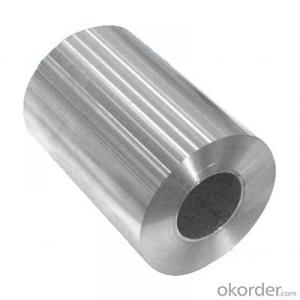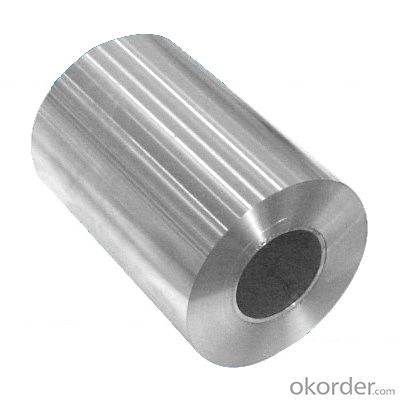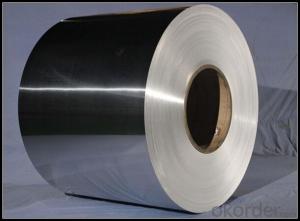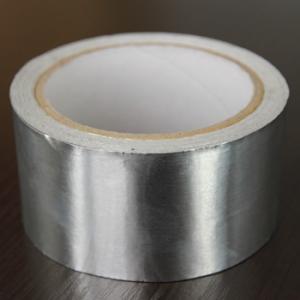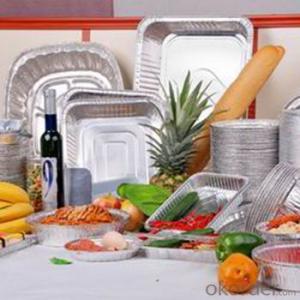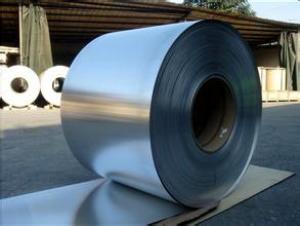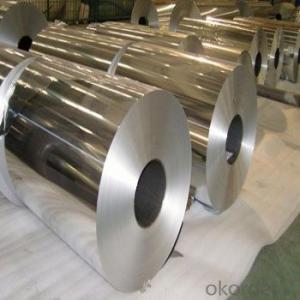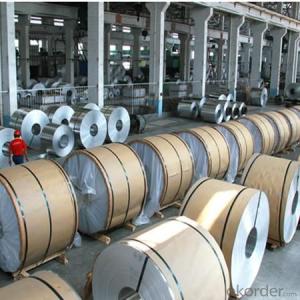Thin Aluminum Coil - Waterproof Industrial Jumbo Rolls Alloy Aluminum Foil 1100
- Loading Port:
- Shanghai
- Payment Terms:
- TT OR LC
- Min Order Qty:
- 5 m.t.
- Supply Capability:
- 6000 m.t./month
OKorder Service Pledge
OKorder Financial Service
You Might Also Like
Specification
Waterproof Industrial Jumbo Rolls Alloy luminium Foil 1100
Packaging & Delivery
Name | 3003 Aluminum Coil |
ALloy or Not | Yes |
Alloy | 1100H-18, 3003-H24,3003-H26,3005-H26,8011,3004,3105,5005,etc. |
Thickness | 0.1~1.5mm |
Width | <2000mm< span=""> |
MOQ | 1 MT |
Coating finish | Brushed, drawing, embossed, printing |
Color | As to code RAL |
Surface | Embossed,Mill Finish,Coated,Brushed |
Gloss | 10-90%(EN ISO-2813:1994) |
Total coating thick | PVDF27 ~35micron |
Polyester18~27micron(EN ISO-2360:1995) | |
Coating hardness | 2H |
Adhesion | 5B (EN ISO-2409:1994) |
Impact resistance | No cracking and peeling (A.S.T.M D2794-1993) |
Flexibility (T-bend) | 0T- 2T |
MEK resistance | 100 |
Certification | ISO9001:2000, CE, SGS |
Coil's standard diameter | 1100mm |
Inner Diameter | 405mm/505mm |
Coil's standard weight | 1MT - 2MT |
Product Specification | |
Grade | 1000 Series: 1050 1060 1100 3000 Series: 3003 3004 3105 5000 Series: 5052 5605,5083 6000 Series: 6061 6063 8000 Series: 8011 8021 8079 |
Thickness | 0.20-8.00mm |
Width | 2400mm max. |
Grade | 1000,3000,5000,6000,8000series |
Coil ID | 75mm, 150mm, 200mm, 300mm, 400mm, 508mm or negotiable |
Coil weight | 1000-5000kgs |
Coil OD | 1700mm max. |
Temper | O, H12, H14, H16, H111, H22 ,H24, H26, H28,T4, T6,etc. |
Chemical Composition | |||||||||
| Grade | Si | Fe | Cu | Mn | Mg | Cr | Ni | Zn | Al |
| 1050 | 0.25 | 0.4 | 0.05 | 0.05 | 0.05 | - | - | 0.05 | 99.5 |
| 1060 | 0.25 | 0.35 | 0.05 | 0.03 | 0.03 | - | - | 0.05 | 99.6 |
| 1070 | 0.2 | 0.25 | 0.04 | 0.03 | 0.03 | - | - | 0.04 | 99.7 |
| 1100 | Si+Fe:0.95 | 0.05-0.2 | 0.05 | - | - | 0.1 | - | 99 | |
| 1200 | Si+Fe:1.00 | 0.05 | 0.05 | - | - | 0.1 | 0.05 | 99 | |
| 1235 | Si+Fe:0.65 | 0.05 | 0.05 | 0.05 | - | 0.1 | 0.06 | 99.35 | |
| 3003 | 0.6 | 0.7 | 0.05-0.2 | 1.0-1.5 | - | - | - | 0.1 | remains |
| 3004 | 0.3 | 0.7 | 0.25 | 1.0-1.5 | 0.8-1.3 | - | - | 0.25 | remains |
| 3005 | 0.6 | 0.7 | 0.25 | 1.0-1.5 | 0.20-0.6 | 0.1 | - | 0.25 | remains |
| 3105 | 0.6 | 0.7 | 0.3 | 0.30-0.8 | 0.20-0.8 | 0.2 | - | 0.4 | remains |
| 3A21 | 0.6 | 0.7 | 0.2 | 1.0-1.6 | 0.05 | - | - | 0.1 | remains |
| 5005 | 0.3 | 0.7 | 0.2 | 0.2 | 0.50-1.1 | 0.1 | - | 0.25 | remains |
| 5052 | 0.25 | 0.4 | 0.1 | 0.1 | 2.2-2.8 | 0.15-0.35 | - | 0.1 | remains |
| 5083 | 0.4 | 0.4 | 0.1 | 0.40-1.0 | 4.0-4.9 | 0.05-0.25 | - | 0.25 | remains |
| 5154 | 0.25 | 0.4 | 0.1 | 0.1 | 3.1-3.9 | 0.15-0.35 | - | 0.2 | remains |
| 5182 | 0.2 | 0.35 | 0.15 | 0.20-0.50 | 4.0-5.0 | 0.1 | - | 0.25 | remains |
| 5251 | 0.4 | 0.5 | 0.15 | 0.1-0.5 | 1.7-2.4 | 0.15 | - | 0.15 | remains |
| 5754 | 0.4 | 0.4 | 0.1 | 0.5 | 2.6-3.6 | 0.3 | - | 0.2 | remains |
| 6061 | 0.40-0.8 | 0.7 | 0.15-0.40 | 0.15 | 0.8-1.2 | 0.04-0.35 | - | 0.25 | remains |
| 6063 | 0.20-0.6 | 0.35 | 0.1 | 0.1 | 0.45-0.9 | 0.1 | - | 0.1 | remains |
| 6082 | 0.7-1.3 | 0.5 | 0.1 | 0.40-1.0 | 0.6-1.2 | 0.25 | - | 0.2 | remains |
| 6A02 | 0.50-1.2 | 0.5 | 0.20-0.6 | Or Cr0.15-0.35 | 0.45-0.9 | - | - | 0.2 | remains |
| 8011 | 0.50-0.9 | 0.6-1.0 | 0.1 | 0.2 | 0.05 | 0.05 | - | 0.1 | remains |
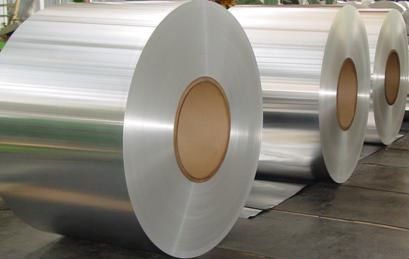
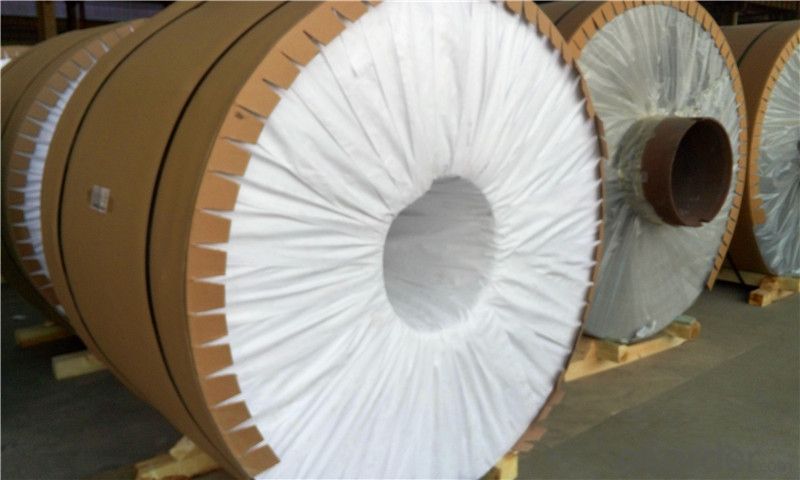
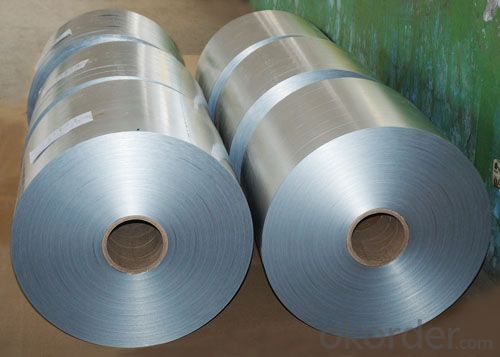
- Q: What are the proper storage methods to maintain the quality of aluminum coil for future use?
- <p>To store aluminum coil for future use, ensure it is kept in a cool, dry place away from direct sunlight and moisture. Stack the coils on flat, level surfaces with appropriate padding to prevent damage. Avoid stacking with other metals to prevent galvanic corrosion. Use clean, dry hands or gloves when handling to prevent oil and dirt from contaminating the surface. Store in a controlled environment with a relative humidity below 65% and a temperature between 32掳F to 90掳F (0掳C to 32掳C). Regularly inspect the coils for any signs of corrosion or damage.</p>
- Q: Do you have an aluminum coil first? Is there an aluminum plate?
- Yes, all aluminium sheets are made of aluminium rolls after slitting. The general process of aluminum plate production is: aluminium ingot - aluminum water - casting roll - aluminum roll ---- aluminum plate [Ji'nan excellent aluminum industry]. Welcome to visit.
- Q: What are the different coil uncoiling options for aluminum coils?
- There are several different coil uncoiling options available for aluminum coils. These options vary based on the specific needs and requirements of the application. One common method is manual uncoiling, where the coil is unwound by hand. This is typically used for smaller coils or in situations where precision and control are important. Manual uncoiling allows for careful handling of the aluminum coil and is often used in smaller scale operations. Another option is mechanical uncoiling, which involves using a machine or equipment to unwind the coil. Mechanical uncoiling is suitable for larger coils or high-volume production. It allows for faster and more efficient uncoiling, reducing the labor involved in the process. Furthermore, there are specialized uncoiling machines available that can handle specific requirements. For instance, some machines are designed for delicate or sensitive materials and offer features like adjustable tension control to prevent any damage to the aluminum coil during uncoiling. In addition to these options, there are also custom uncoiling solutions that can be designed to meet specific needs. These solutions may involve different mechanisms or techniques to ensure the safe and efficient uncoiling of aluminum coils. Ultimately, the choice of coil uncoiling option depends on factors such as the size of the coil, production volume, level of precision required, and any specific needs or constraints of the application.
- Q: What are the different mechanical properties of aluminum coils?
- Aluminum coils are highly sought after for a variety of uses due to their diverse mechanical properties. Some key properties of aluminum coils include: 1. Strong: Aluminum coils are impressively strong, making them suitable for structural purposes. Their strength can be further enhanced through alloying or heat treatment processes. 2. Flexible: Aluminum coils are highly malleable, allowing for easy shaping and forming. This property enables the creation of intricate designs and complex shapes without compromising the integrity of the material. 3. Lightweight: Aluminum is known for its low density, making it one of the lightest metals available. This characteristic makes aluminum coils ideal for industries like aerospace and automotive, where weight reduction is crucial. 4. Resistant to corrosion: Aluminum naturally resists corrosion, forming a protective oxide layer that prevents further oxidation. This quality makes aluminum coils suitable for outdoor and marine environments, as they can withstand harsh conditions and require minimal maintenance. 5. Good conductivity: Aluminum is an excellent conductor of both heat and electricity. This characteristic makes aluminum coils ideal for applications that require efficient heat transfer, such as in heat exchangers and electrical wiring. 6. Easy to machine: Aluminum coils can be easily machined due to their low melting point and the way they form chips. This characteristic allows for high-speed machining operations, resulting in reduced production time and costs. 7. Weldable: Aluminum coils can be easily welded using various techniques, such as TIG or MIG welding. This characteristic enables the fabrication of complex structures and the joining of aluminum components. 8. Resistant to fatigue: Aluminum exhibits excellent fatigue resistance, allowing it to withstand repeated stress cycles without failure. This quality makes aluminum coils suitable for applications subjected to cyclic loading, such as automotive components or structures exposed to wind or waves. Overall, the combination of unique mechanical properties possessed by aluminum coils, including strength, flexibility, lightweight, corrosion resistance, conductivity, machinability, weldability, and fatigue resistance, makes them a versatile material choice for a wide range of industries and applications.
- Q: Why the end of the aluminum coil will have a yellow spot?
- The reason may be that the manufacturer is not cleaned, and must be carefully cleaned before coating, or there may be paint fall off phenomenon.
- Q: Are there any specific guidelines for the handling of aluminum coils?
- There exist specific guidelines for the handling of aluminum coils, with several key points to consider: 1. Appropriate lifting techniques: To handle aluminum coils, it is crucial to utilize suitable lifting equipment such as cranes or forklifts. These tools must possess the capacity to handle the weight of the coils in order to prevent accidents or damage. 2. Usage of protective gear: Workers must wear personal protective equipment (PPE) like gloves and safety goggles to safeguard themselves against sharp edges or potential injuries during handling. 3. Secure packaging: Aluminum coils must be stored or transported in secure packaging to prevent damage. This can be accomplished by employing suitable pallets, straps, or protective covers to ensure that the coils are held in place and protected against external factors like moisture or impact. 4. Proper stacking: When storing or transporting aluminum coils, it is vital to stack them in a manner that guarantees stability and prevents them from falling or causing accidents. The coils should be stacked evenly and securely, with adequate support and spacing between each stack to avoid deformation or damage. 5. Avoidance of contact with corrosive materials: Aluminum coils should not come into contact with corrosive materials such as acids or alkalis, as they can cause damage or corrosion to the metal. It is important to store aluminum coils in a clean and dry environment to preserve their quality. 6. Gentle handling: Aluminum coils are prone to scratches, dents, and other forms of damage, thus they should be handled with care to avoid these issues. Dragging or sliding the coils during handling should be avoided, and they should be placed gently to prevent any potential damage. 7. Training and supervision: Workers involved in the handling of aluminum coils should receive adequate training and supervision to ensure adherence to the specific guidelines and safety procedures. Regular training sessions can help refresh their knowledge and reinforce safe handling practices. By adhering to these guidelines, the proper handling of aluminum coils can be ensured, thereby reducing the risk of accidents, damage, or loss of quality.
- Q: What are the insulation options available for aluminum coils?
- There are various insulation options available for aluminum coils, including fiberglass insulation, foam insulation, and elastomeric insulation. These insulation materials help to improve the energy efficiency of the coils and prevent condensation or heat loss.
- Q: Can aluminum coils be customized to specific requirements?
- Yes, aluminum coils can be customized to specific requirements. Aluminum coils are highly versatile and can be tailored to meet a wide range of specifications and applications. Customization options include the choice of alloy, thickness, width, and length of the coil, as well as various surface treatments such as coatings, finishes, and embossing. Additionally, aluminum coils can be customized in terms of mechanical properties, such as strength, flexibility, and corrosion resistance, to suit specific needs. The customization process involves working closely with manufacturers or suppliers who have the expertise and facilities to meet the desired requirements. Whether it's for the aerospace industry, automotive sector, construction projects, or any other application, aluminum coils can be customized to meet specific requirements and deliver optimal performance.
- Q: This question asks for the distinctions between a single-layer aluminum coil and a multilayer aluminum coil, focusing on their structure and potential applications.
- <p>A single-layer aluminum coil consists of a single sheet of aluminum wound into a roll, while a multilayer aluminum coil is made up of multiple sheets of aluminum stacked and wound together. Single-layer coils are simpler in structure and are often used for applications requiring less complexity, such as basic insulation or simple wrapping. Multilayer coils, on the other hand, offer increased strength and can provide better insulation properties due to the multiple layers. They are also used in applications where space is limited, as they can be more compact. Additionally, multilayer coils can be tailored for specific heat transfer or electrical conductivity needs by varying the thickness and composition of the layers.</p>
- Q: Can aluminum coils be used for food storage containers?
- Yes, aluminum coils can be used for food storage containers. Aluminum is a popular choice for food storage containers due to its many beneficial properties. It is lightweight, durable, and has excellent thermal conductivity, meaning it can evenly distribute heat for efficient cooking or cooling. Additionally, aluminum is non-toxic, odorless, and resistant to corrosion, making it a safe option for storing food. It also provides an effective barrier against light, moisture, and oxygen, which helps to preserve the freshness and quality of the stored food. Overall, aluminum coils can be a reliable and practical choice for food storage containers.
Send your message to us
Thin Aluminum Coil - Waterproof Industrial Jumbo Rolls Alloy Aluminum Foil 1100
- Loading Port:
- Shanghai
- Payment Terms:
- TT OR LC
- Min Order Qty:
- 5 m.t.
- Supply Capability:
- 6000 m.t./month
OKorder Service Pledge
OKorder Financial Service
Similar products
Hot products
Hot Searches
Related keywords
